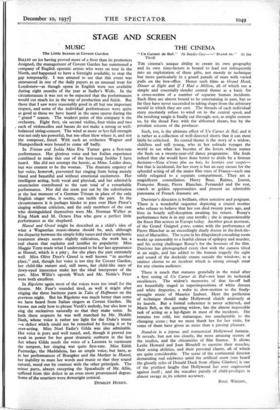STAGE AND SCREEN
MUSIC
The Little Season at Covent Garden
BALLET on ice having proved more of a frost than its promoters designed, the management of Covent Garden has summoned a company of English operatic artists who were on tour in the North, and happened to have a fortnight available, to stop the gap temporarily. I was amused to see that this event was announced in one of the daily papers as an unusual treat for Londoners—as though opera in English were not available during eight months of the year at Sadler's Wells. In the circumstances it was not to be expected that the performances would cut much ice in the way of production and finish. But those that I saw were reasonably good in all but one important respect, and some of the individual performances were quite as good as those we have heard in the same operas during the "
grand" season. The weakest point of this company is the orchestra. Eight first, six second violins, four violas and two each of violoncellos and basses do not make a strong or well- balanced string-consort. The wind at more or less full strength was not only too powerful, but too often blew where it, and not the composer, listed. With such an orchestra Wagner and Humperdinck were bound to come off badly.
In Tristan and Isolda Miss Eva Turner gave a first-rate performance. Her glorious voice and her Italian experience combined to make this one of the best-sung Isoldas I have heard. She did not attempt the heroic, as Mme. Leider does, but was content to be the woman. The dramatic urgency of her voice, however, prevented her singing from being merely bland and beautiful and without emotional excitement. Her intelligent acting, both vocal and physical, and her admirable enunciation contributed to the sum total of a remarkable performance. Nor did she seem put out by the substitution at the last moment of a German Tristan in place of the only English singer who, it seems, can tackle the part. In the circumstances it is perhaps kinder to pass over Herr Pistor's singing without criticism, and the only members of the cast who distinguished themselves were Mr. Norman Walker as King Mark and M. Octave Dua who gave a perfect little performance as the shepherd.
Hansel and Gretel might be described as a child's idea of what a Wagnerian music-drama should be, and, although the disparity between the simple folky tunes and their symphonic treatment always seems slightly ridiculous, the work has a real charm that explains and justifies its popularity. Miss Maggie Teyte made what I understand to be her last appearance as Hansel, which is a pity ; for she plays the part extremely well. Miss Olive Dyer's Gretel is well known "in another place," and, though her voice is too tiny for Covent Garden, her child-like stature and, still more, her child-like stare of dewy-eyed innocence make her the ideal interpreter of the part. Miss Willis's ogreish Witch and Mr. Noble's Peter were both excellent.
In Rigoletto again most of the voices were too small for the theatre. Mr. Fear's sounded tired, as well it might after singing the three baritone parts in Tales of Hoffmann on the previous night. But his Rigoletto was much better than some we have heard from Italian singers at Covent Garden. He knows not only how to phrase Verdi's melody, but also how to sing the recitatives naturally so that they make sense. In both these respects he was well matched by Mr. Heddle Nash, whose voice is rather too light for the Duke's music —a defect which could not be remedied by forcing it or by over-acting. Miss Noel Eadie's Gilda was also admirable. Her voice is pure and well tuned, and, though it proved too weak in power for her great dramatic outburst in the last Act where Gilda needs the voice of a Leonora to surmount the tempest, her singing was quite first-rate. Miss Edith Furmedge, the Maddalena, has an ample voice, but here, as in her performances of Brangane and the Mother in Hansel, her inability to mate her words and music so that they sound natural, stood out by contrast with the other principals. The minor parts, always excepting the Sparafucile of Mr. Allin, suffered from this defect in an even more pronounced degree. Some of the courtiers were downright comical.
DYNELEY HUSSEY.






















































 Previous page
Previous page